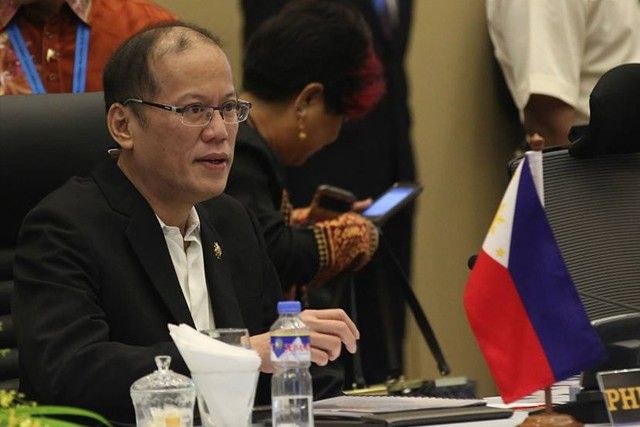Noy on WPS: We asserted our rights without war

MANILA, Philippines — Despite the Chinese seizure of Panatag Shoal in 2012 after a standoff with the Philippine Navy, former president Benigno Aquino III said his administration was never remiss in its duty to protect the country’s territory, citing Manila’s victory against Beijing before an international arbitral court.
In an interview with Eagle News Service, Aquino said he understands the difficulty of defending domestic interest from machinations by a superpower, but war need not be waged over it.
He was reacting to President Duterte’s pronouncement in his fourth State of the Nation Address (SONA) on July 22 that the country lost Panatag Shoal to the Chinese when the Philippines pulled its forces out of the area. The move allowed China to take hold of the shoal.
The former president reiterated that China suddenly backed out of a US-brokered agreement that Filipino and Chinese forces leave the shoal simultaneously, in what should have been a face saving tack for both parties.
“What’s painful is that we left and they did not,” Aquino said.
Bad weather also prompted his administration to order a pullout of Filipino forces from Panatag, he added.
He said China would later deny agreeing to any arrangement brokered by the US or any other party. Beijing also refused to join the arbitration proceedings initiated by Manila in 2013.
Apparently, Aquino said China looks only after its interest and whatever is right or wrong depends solely on its judgment.
Aquino maintained there are ways to deal with sea disputes without going to war. For instance, he noted that Argentina and Indonesia had been dealing with Chinese incursions strongly but their actions had never ignited full-scale war.
Duterte has been repeatedly saying that the Philippines would be obliterated if war with China erupts and that it’s not yet time to assert the country’s rights even if the West Philippine Sea “is ours.”
While it may be difficult for the Philippines as a small country to deal with China’s provocations, Aquino pointed out that there is also a lot at stake for a superpower if it acts like a bully.
Aquino said it is likewise important to determine if China could be trusted when it enters into agreements with other countries.
When it comes to the South China Sea dispute, Aquino explained there are mechanisms in the United Nations Convention on the Law of the Sea and other agreements that could be used to settle the matter.
“Do you think other countries would not be worried to deal with the People’s Republic of China… if it comes out as a bully?” Aquino argued.
Like all other countries in the world, Aquino said China needs access to markets, especially raw materials for its people and economy, and that trading partners would only want to deal with responsible members of the international community.
“If you show that you’re a bully, then you just took the initiative to make things hard for yourself,” Aquino said.
The former president also said fighting for rights is inevitable when they are trampled upon – otherwise the offender would be emboldened to commit further abuses.
“If we are friends, then friends must show respect for the rights of one another,” Aquino said.
The former president also noted that the Association of Southeast Asian Nations (ASEAN) had been working on a Code of Conduct with China to avoid tension in the South China Sea but instead of exercising self-restraint, Beijing built islands and put up facilities even in disputed areas.
No conflict
At Malacañang, presidential spokesman Salvador Panelo said there is no conflict between the Palace’s and top security officials’ statements on the status of China’s presence in the West Philippine Sea.
National Security Adviser Hermogenes Esperon Jr. and Defense Secretary Delfin Lorenzana said on Tuesday that what Duterte said in his SONA was that China was “in position” in the West Philippine Sea and not “in possession.”
The officials all recognize that Beijing has constructive possession of certain areas in the South China Sea, such as that they are in possession of some of the islands.
“With respect to the position of Secretaries Esperon and Lorenzana, when they said, they are in position they were actually referring to what I said yesterday. Remember, you were asking me… I said, I called that legal or constructive possession because their explanation is the same as my explanation,” Panelo said.
“Because they have a military installation they have air, ships and port… so they have control in the entire area. That’s what they are saying, they are positioning… they are in constructive possession by reason of control of those military… there is no contradiction whether it’s possession or position,” he explained.
He emphasized that the President continues to assert the country’s sovereign rights in the area and recognizes the arbitral award to the Philippines.
“He said no ifs and no buts, it’s ours, the problem is they are in possession whether constructive or actual possession,” Panelo said.
Duterte will pursue peaceful strategy in dealing with the issue, instead of advocating violence or taking up of arms against Beijing, he pointed out.
“What the President says, I do not want to trigger any harm, which is a possibility in any contending parties with respect to Scarborough Shoal,” he said.
Informed of a reported conflict between China and Vietnam on the same issues, Panelo said the Philippines would maintain using the diplomatic channel to avoid untoward incidents.
“It means also risking arms hostilities between the two countries. It’s risking the lives of its people. But they can do that but there are always risks,” Panelo said.
Permission needed
Meanwhile, Foreign Affairs Secretary Teodoro Locsin Jr. said China cannot demand traditional fishing rights in the Philippines’ exclusive economic zone (EEZ) as permission is always needed.
“Well, obviously, an outside country cannot demand traditional fishing rights in any situation. We just say no and shore batteries if sustainable onshore will just blow them out of the water with no international consequences. Permission is always needed,” Locsin tweeted.
“If only climate change got worse much faster all our problems in the South China Sea would be swallowed by the rising sea levels. What we cannot keep we will not lose except to the sea. Coastal communities will be gone but national honor will be safe,” Locsin said.
Locsin also said he wants paintings at the Department of Foreign Affairs diplomatic reception room removed and replaced with giant maps of the Philippines.
“Now thank you for that. Since you’re in touch with NAMRIA could you kindly follow up for me, I beg you, my request for giant maps to wallpaper the diplomatic reception room in DFA so all may know all we own in the South China and other seas. I wanna get rid of the paintings,” Locsin said in his tweet addressed to Jay Batongbacal, professor at the University of the Philippines College of Law and director of the university’s Institute for Maritime Affairs.
“No. Only technical maps of everything that’s ours and we will never give up so visitors leave without delusions of self-grandeur,” he said.
Earlier, Supreme Court (SC) Senior Associate Justice Antonio Carpio said an international agreement may allow foreign nations to fish inside another state’s EEZ but only in case of a “surplus,” which he said does not exist in the Philippines.
Carpio again warned that allowing the Chinese to fish in the Philippines’ EEZ is a violation of the 1987 Constitution, which reserves the exclusive right to exploit resources in the EEZ to Filipinos.
The Senate leadership, meanwhile, is cool to Carpio’s call that senators reject Duterte’s verbal fishing agreement with Chinese president Xi Jinping.
“How can we ratify something that has not been transmitted to the Senate?” Senate President Vicente Sotto III told reporters.
Sen. Aquilino Pimentel III, chairman of the committee on foreign relations, said the chamber goes over treaties and international agreements submitted to it. “In all likelihood, all of these submissions will be in writing.”
“There’s no practical way for the Senate to ‘review’ an alleged verbal agreement between states. In this day and age, international agreements are almost always in writing,” he said. – With Pia Lee-Brago, Paolo Romero
- Latest
- Trending































